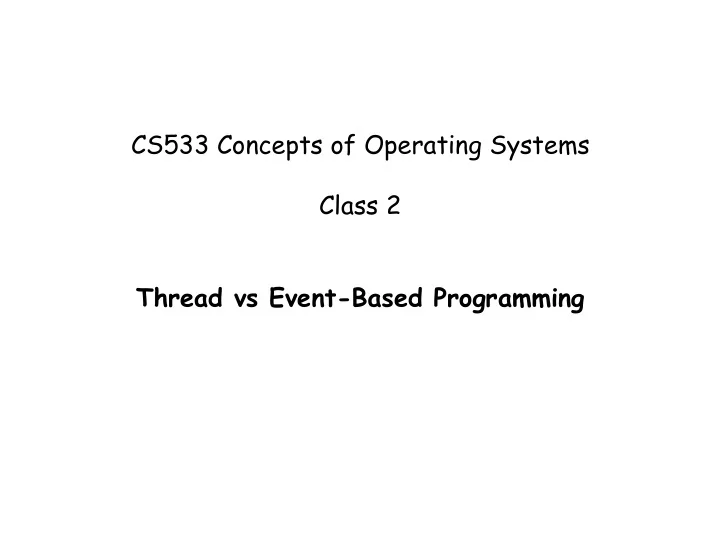

CS533 Concepts of Operating Systems Class 2 Thread vs Event-Based Programming
Questions Why are threads “lightweight”? Why block instead of spin waiting for a mutex? If a mutex is a resource scheduling mechanism o What is the resource being scheduled? o What is the scheduling policy and where is it defined? What is coarse-grain locking? o What effect does it have on program complexity? o What effect does it have on performance? 2 2 CS533 - Concepts of Operating Systems CS533 - Concepts of Operating Systems
Questions What is “lock contention”? o Why is it worse on multiprocessors than uniprocessors? o What is the solution? … and its cost? What else might cause performance to degrade when you use multiple threads? Why is multithreaded programming hard? 3 3 CS533 - Concepts of Operating Systems CS533 - Concepts of Operating Systems
Which style is used in modern OSs? Are modern operating systems (such as Linux) written in an event-based or multi-threaded style? How does event-based programming relate to interrupt handling? Where is the boundary between interrupt handling and thread execution? o How does this affect the approaches used for synchronization? 4 CS533 - Concepts of Operating Systems
Concurrent Computation vs Concurrent Blocking How is the CPU scheduled: o In an event-based system? o In a thread-based system? How is live state managed across blocking I/O calls: o In an event-based system? o In a thread-based system? 5 CS533 - Concepts of Operating Systems
Managing Highly Concurrent I/O What is the problem with making thread allocation decisions statically? o What is the Slashdot effect? Why is multi-threading not a good match for massive concurrency? o Is web service embarrassingly parallel? o What is the problem with the thread-per request model? o Why does the event handling model help? 6 CS533 - Concepts of Operating Systems
Questions What is a thread pool? Why do the following techniques help during heavy load? o Thread pool resizing o Event batching o Adaptive load shedding Why does pipeline parallelism scale well? o Thread per stage vs thread per request What does it mean for a service to be “well conditioned”? 7 CS533 - Concepts of Operating Systems
Recommend
More recommend